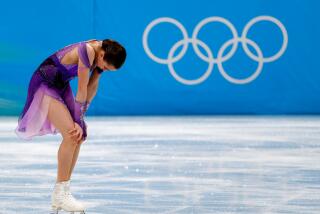Experimental Test Indicates Steroid Use : Johnson Not Only One Taking Banned Substances, IOC Doctor Says
- Share via
TORONTO — An experimental drug test of male track and field athletes in the 1988 Summer Olympics indicated that Canadian sprinter Ben Johnson was not the only one who had used anabolic steroids or other banned muscle-building substances in training, a leading member of the International Olympic Committee’s medical commission said Wednesday.
But Dr. Manfred Donike denied that he had told a West German television commentator that the experiment revealed that 80% of the 115 or so male track and field athletes tested at Seoul might have used steroids within five to eight years of the 1988 Games.
“He misunderstood a lot of things,” Donike said of Bernd Heller, who testified Wednesday before the Canadian government’s commission of inquiry into drug use by athletes about an interview he conducted with the doctor in March.
Heller, a former pole vaulter and decathlete who is the host of a weekly television sports show broadcast from Mainz, West Germany, was asked to testify by the attorney for Charlie Francis, Ben Johnson’s coach.
Francis told the commission in February that he suspected most elite track and field athletes at Seoul had used steroids, even though Johnson was the only one who tested positive. But Donike disputed the 80% figure reported by Heller.
“There is no indication of that percentage of the drug effect, that the connection to steroids would be so high,” Donike said from his laboratory in Cologne, West Germany. “That is a figure people speculate. No one has any proof.
“And how can anybody claim I said the tests could go back five to eight years? It’s ridiculous to make such a claim.”
Heller told the commission that Donike had retracted his earlier statement in a subsequent interview Monday.
“It might be possible that I understood him wrong,” Heller told reporters after concluding his testimony.
Donike, however, acknowledged that an experimental test was conducted for research purposes on the urine samples collected from male track and field athletes at Seoul to determine whether there were indications of steroid use within three to six months of the competition.
He said there were positives, but he would not reveal the number. He is scheduled to submit a report to the IOC medical commission in October at Moscow.
Donike said the test measures the endocrine glands’ production of male hormones, which is suppressed if an athlete uses an unnatural male hormone derivative, such as a steroid. If the test reveals that natural production has been suppressed, Donike said the assumption is that the athlete used a steroid.
Another member of the IOC medical commission, Dr. Donald Catlin, director of the UCLA laboratory, said in a telephone interview that the test probably could not be used for punitive purposes because it does not specify the type of steroid taken by the athlete.
“I think it holds some promise as an indicator of possible steroid use, but not as a definitive test,” he said. “We would not use it as an accusatory test.
“But it could have some use to the medical and sports community in that it could indicate areas where we should increase our testing efforts and our educational efforts.”
More to Read
Go beyond the scoreboard
Get the latest on L.A.'s teams in the daily Sports Report newsletter.
You may occasionally receive promotional content from the Los Angeles Times.






